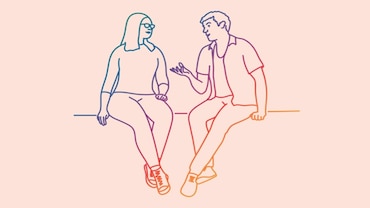- HOME
- /
- Better Living
- /
Find Your New Favourite Hobby
Have more fun. Learn new things. These aren’t bad New Year’s resolutions! Here’s how to get started
 Kativ/Getty Images (colored pencils). Nina Dumitru /500px/Getty Images (succulent). Adam Smigielski/Getty Images (whisk). TYNZA/Getty Images (spoons). jchizhe/Getty Images (camera)
Kativ/Getty Images (colored pencils). Nina Dumitru /500px/Getty Images (succulent). Adam Smigielski/Getty Images (whisk). TYNZA/Getty Images (spoons). jchizhe/Getty Images (camera)
Kate Hanselman’s home is a shrine to hobbies past and present. Fencing gear sits beside multiple pairs of rock-climbing shoes.
“I find yarn everywhere because I love knitting, and I have a whole set of embroidery stuff,” she says. Plus: stacks of puzzles, her partner’s golf clubs and equipment from his flying lessons.
“Our house is like a full hobby station,” she says with a laugh.
Challenging, fun and engaging hobbies have the power to make us happier and healthier, says Hanselman, a nurse practitioner with the counselling practice Thriveworks. Such pursuits help us grow in creative, physical and intellectual ways, and can boost self-esteem. Plus, they often foster connection with others. Hobbies lead to better physical health, more sleep, lower stress, greater life satisfaction, a larger social network and improved work performance. “Hobbies live in the pleasure world, not necessarily the mastery world,” Hanselman says. “We’re not trying to impress the board, we’re not going for a paycheck, there’s no ulterior motive. Hobbies are like dessert—and as a baker myself, dessert is the most important part.”
That resonates with Chris Johnson, recreational woodworker, motorcyclist, gardener, cook and runner. He has accepted that he’ll never be a master surfer, but that doesn’t dampen his enjoyment of riding waves. And he’s so taken with beekeeping that his backyard is now home to 20,000 honeybees.
“I really love learning and figuring things out, and developing an understanding of how things tick,” says Johnson, of Carolina Beach, North Carolina. His hobbies tend to evolve out of curiosity, boredom or need. Take the bees: After moving into a new home with a barren yard, he was concerned about a lack of pollinators, so he planted a garden and became a beekeeper.
“If you derive joy from your hobby—it doesn’t matter if it’s a board game or beekeeping—I’m confident it will make you a better person in every aspect of your life,” he says. But where do you start? We asked experts how to discover the hobbies you don’t yet know you’ll love.
ASK YOURSELF HOW YOU WANT TO FEEL
Hobbies present an escape—they can help you get out of your head and calm down, says Matthew J. Zawadzki, an associate professor of health psychology at the University of California, Merced, who has researched the connection between leisure and well-being. He suggests asking yourself how you want an activity to make you feel. Mentally engaged? Distracted? Relaxed? Socially connected?
It’s also helpful to consider what your life is missing, like creativity or physical activity. “Recognize that you have different needs at different moments, and that’s OK,” he says. There’s no such thing as one perfect hobby.
START SMALL
Don’t invest a ton of time and money in a new hobby immediately. Ease in to figure out if it’s right for you, advises Rebecca Weiler, a mental health counsellor specializing in career counselling. “You can always do more later,” she says. If you’re wondering if paintballing might be a good fit, join an outing or two with a local group. Or sign up for a one-time pottery class rather than a set of eight.
It’s also smart to resist the pressure to overcommit. Hanselman enjoyed learning to fence, but the next step was competing, and she didn’t want to do that, so she stopped. “You spend enough of your day pushing yourself,” she says. “Hobbies are supposed to be fun.”
BE OPEN
Keeping an open mind and not dismissing potential hobbies—even if they seem out of your wheelhouse—is key, says Katina Bajaj, a clinical psychology researcher and co-founder of Daydreamers, a company that helps adults tap into their imagination, creativity and curiosity. She and her husband recently went hiking in San Francisco, where they live, and someone handed them a pamphlet of plants to look for along the trail, such as miner’s lettuce. Instead of tossing it, they paid attention, and now they have a new hobby—foraging.
“We’re wired as humans to be curious and open, but in a very burnt-out world, we forget that,” she says. “It’s the first thing to go.” So next time someone hands you a flier or invites you to tag along to an event, seize the opportunity. It could introduce you to something you never guessed you’d love.
 Francesco Carta fotografo/Getty Images; CatLane/Getty Images
Francesco Carta fotografo/Getty Images; CatLane/Getty Images
TAKE A TRIP BACK IN TIME
When you were a kid, what did you want to be when you grew up? The answer could point you toward an appealing hobby, Weiler says. “If you wanted to be a national-level player, what can you do now that fulfills that urge for you?” she asks. Joining a softball team or coaching some neighbourhood kids could reignite a long-dormant passion.
The nostalgia doesn’t have to stop there. Revisit activities you loved when you were young, Bajaj suggests, like drawing, putting together model kits, collecting things or building clay figures. “It’s a really helpful place to start, and it allows you to feel comfortable,” she says. Childhood delights can easily evolve into adult hobbies.
GO BACK TO SCHOOL
Consider auditing a class at a university or signing up for a lesson to learn more about a potential hobby, Weiler advises. Always dreamed of writing a novel? Join a fiction writers group. Fascinated by family history? Take a genealogy class. Plenty of e-courses are available free or for a nominal price.
TAKE AN ASSESSMENT
Lots of colleges offer career assessments to help students determine what to major in and how to navigate their professional lives. You can also use these tools to glean insights about potential hobbies, especially for those where you’re starting from square one, Weiler says. If you’re a college graduate, connect with your university’s alumni centre; sometimes they make these assessments available for free. Or you can pay a career counsellor for access.
KEEP A LIST
Hanselman and her partner keep a running list on their fridge of all things that strike them as interesting. “Maybe a month from now I’ll be like, ‘Butterfly garden. Why did I think that was a good idea?’ Or it just might be the right time for it,” she says. Log potential interests as they come to you, and you’ll have no shortage of options to explore when you’re ready.
REMOVE GUILT FROM THE EQUATION
Zawadzki’s research indicates that when people feel guilty about spending time on leisure, they experience increased symptoms of depression and anxiety. “Give yourself permission to do something that you like,” he urges—and keep in mind that if a hobby makes you healthier and happier, everyone around you will benefit. Think of discovering new hobbies as an adventure that will add fulfilling new dimensions to your life, and enjoy the process.
From Time (20 April 2023). © 2023 Time USA LLC. All rights reserved. Used under license.






